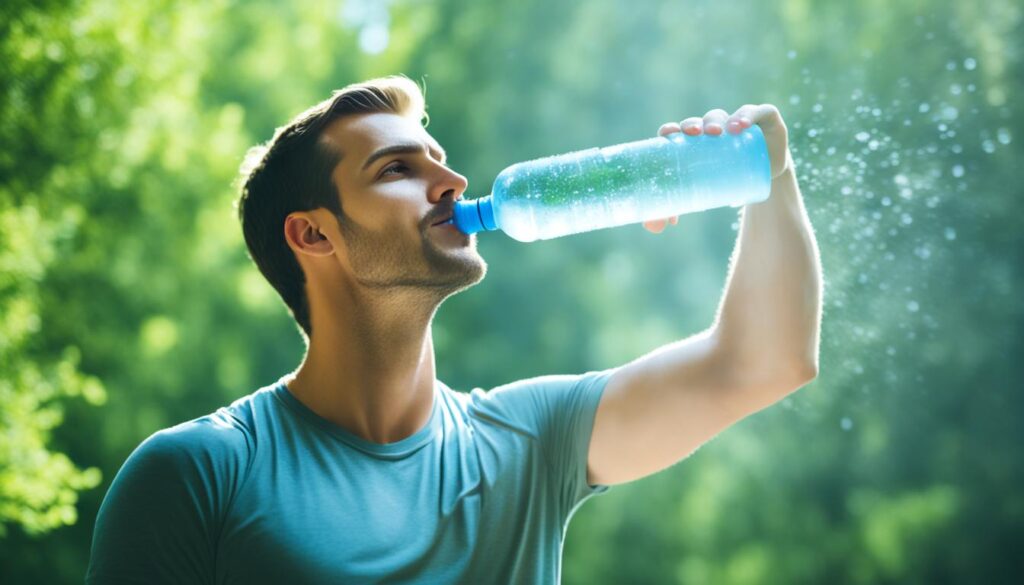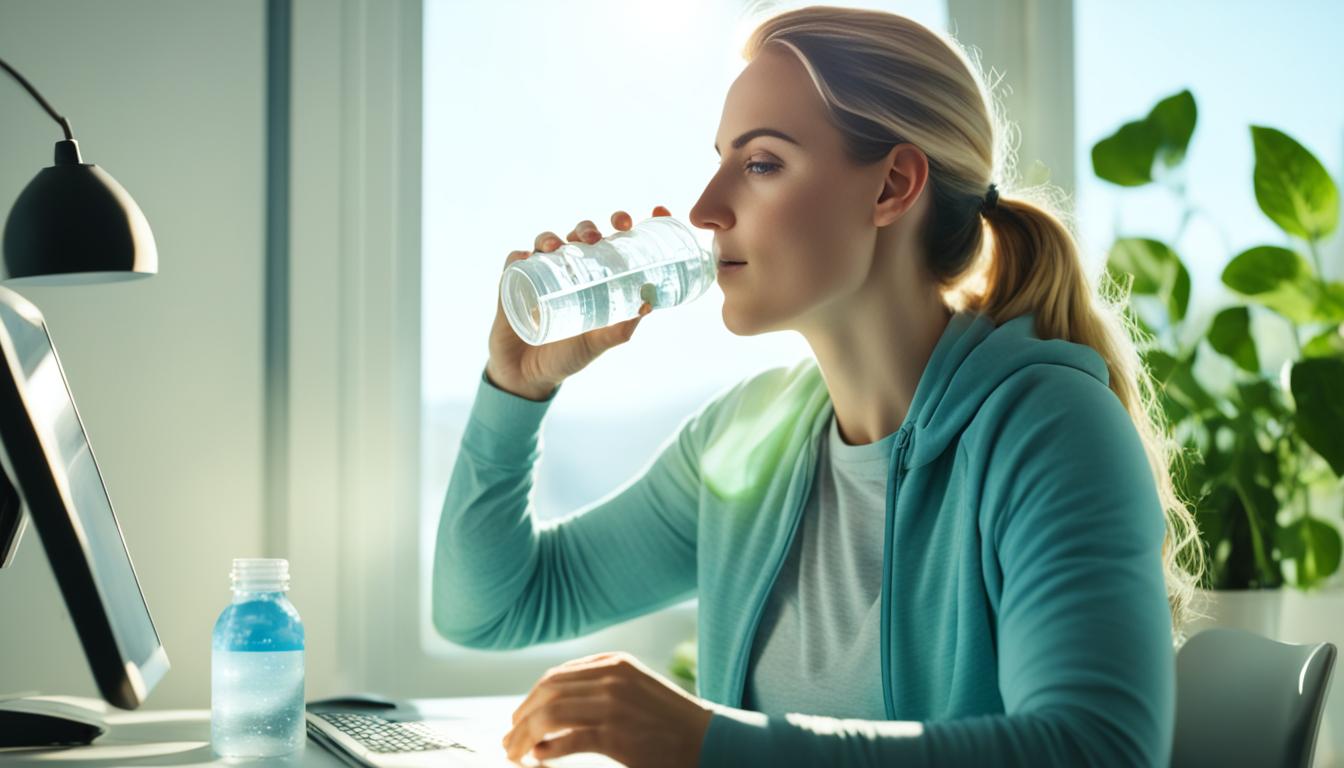It’s vital to stay hydrated for good health and feeling your best. Our bodies are mostly water, about 60%. Water keeps us cool, helps our body work well, greases our joints, and gets rid of waste. Not drinking enough water can lead to problems like tired kidneys or bad electrolytes. How much water you need depends on many things, like your health or how active you are. This guide gives simple tips to drink more water and reminds why it’s important.
Key Takeaways
- Up to 60% of our bodies are made of water.
- About 20% of daily fluid intake comes from food.
- Daily water intake recommendations: 3.7 liters for men, 2.7 liters for women.
- Dark yellow urine can be a sign of dehydration.
- Setting alarms or reminders can help maintain hydration.
The Importance of Staying Hydrated
Knowing why hydration is key helps keep us healthy. Water does a lot for our body, like keeping us cool and taking out the trash. It’s all about the advantages that come from keeping fluids in us.
Regulating Internal Body Temperature
Hydration is great for keeping our temperature just right. When it’s hot or we’re active, water’s there to cool us off. This process is how water keeps our inner temps steady.
It’s important to note that men should try to drink 13 cups a day. On the other hand, women need about 9 cups only.
Metabolizing Food and Regulating Hunger
Hydrating well helps our bodies process food better. It can also stop us from feeling too hungry. This is why drinking water before eating is a good habit to have.
For pregnant ladies, 10 cups of water a day is recommended. If breastfeeding, they should drink even more, about 12 cups.
Lubricating Joints and Flushing Waste
Water keeps our joints moving smoothly and can prevent injuries. It supports those who are active by maintaining flexibility. Hydration also helps us clean out our systems, keeping kidneys happy and avoiding issues like kidney stones.
Here’s a cheat sheet on how much water different groups should drink a day:
| Group | Daily Water Intake |
|---|---|
| Men | 13 cups (3 liters) |
| Women | 9 cups (just over 2 liters) |
| Pregnant Women | 10 cups |
| Breastfeeding Women | 12 cups |
| Kids/Teens | 6 to 8 cups |
Tips for Maintaining Proper Hydration Levels All Day
Staying hydrated is crucial for our bodies to work well and stay healthy. Water is key for keeping our bodies balanced and running smoothly. It helps with keeping our temperature right and our metabolism going. Use these tips to keep up with drinking enough water every day.
First Thing in the Morning Hydration
Starting your day with water is like giving your body a kickstart. It’s the first drink after a long night without any. This habit gets your systems going right away. Doing this each morning can make sure you stay on top of your water intake all day.
Using a Water Bottle
Carrying your own water in a bottle is a great idea. It’s a smart way to make sure you’re getting enough water. Portable bottles make it easy to remember to drink. They’re handy at work, the gym, or anywhere you go.

Setting Alarms and Notifications
Today, our devices can help us remember to drink water. Setting alarms or reminders is easy and useful. They keep you on schedule, which is great when you’re busy. These little notifications help make sure you drink enough water every day.
By making these tips part of your routine, staying hydrated becomes simpler. Paying attention to how much water you drink and using tech to stay on top of it is key. This way, you’re helping your body to be at its best.
Daily Water Intake Recommendations
Staying hydrated is key to good health. Knowing how much water to drink each day is vital. It ensures we meet our body’s needs for hydration.
General Guidelines
The U.S. National Academies of Sciences, Engineering, and Medicine advise men to drink about 15.5 cups (3.7 liters) a day. For women, it’s roughly 11.5 cups (2.7 liters). It’s worth noting that we get about 20% of our daily fluids from food. The rest comes from drinks. Following these guidelines is smart. But, everyone’s specific needs are different.
Individual Needs and Considerations
Hearing that eight glasses of water are a daily must is common. But, our water requirements change depending on things like how active we are and where we are. This is also true for our health status, and for women who are pregnant or breastfeeding.
For example, during pregnancy, aiming for 10 cups a day is wise. If breastfeeding, shoot for around 12 cups. Kids, too, have their water needs. Those aged 1-3 should drink about 4 cups a day. From 4-8 years old, it’s about 5 cups daily.
Special Cases: Athletes and Medical Conditions
Athletes need more water than the average person to stay hydrated during rigorous training. They should drink between half a cup and 2 cups every 15 to 20 minutes.
But remember, too much water can be harmful, especially for athletes. It can cause hyponatremia, where salt levels in the body are off. Athletes should tailor their drinking to their sport and personal needs to stay healthy.
| Group | Daily Fluid Intake |
|---|---|
| Men | 3.7 liters (about 15.5 cups) |
| Women | 2.7 liters (about 11.5 cups) |
| Pregnant Women | 10 cups |
| Breastfeeding Individuals | 12 cups |
| Children (1-3 years) | 4 cups |
| Children (4-8 years) | 5 cups |
| Athletes | Varies by activity |
Some health conditions can change how much water someone needs. It’s important to consider these situations to keep healthy.
Healthy Hydration Habits
Adopting healthy hydration habits can boost your well-being. Try to drink 6 to 8 glasses, each 8 ounces, of water every day. This helps you stay energized and supports your body in many ways, like helping with digestion and keeping your temperature stable.
Start by setting daily water-drinking goals. Using a special water bottle to track your intake can be really helpful. It reminds you to keep drinking throughout the day. Also, check the color of your urine; if it’s light, you’re doing a good job staying hydrated.
Hydration challenges can be a fun way to keep at it. They add a little excitement and push you to drink more each day. Try to drink water instead of sugary drinks most of the time. This cuts down on the sugar you consume, which is good for your health.
Adding fruits like lemon, berries, or cucumber to your water makes it tastier. It’s a simple way to enjoy drinking water more. This helps you keep hydrated all day long.
In conclusion, these practices can really change your everyday life for the better. By focusing on how much and what we drink, we can boost our health. Keep at it with these simple steps to see big improvements in staying hydrated and feeling good.
The Benefits of Proper Hydration
Drinking enough water is crucial for our health and well-being. It has a big impact on our heart, skin, weight, and overall health. Making sure we drink plenty of water can really improve our lives.
Heart Health
Being hydrated helps our heart a lot. It makes the heart work better, reducing the pressure on it. This keeps blood moving smoothly. By drinking enough water, we lower the chance of heart problems and keep blood pressure in check.
Skin and Weight Management
Water is key for healthy skin and helps with weight. It keeps the skin looking fresh and young by moisturizing it from the inside. For weight, water makes us feel full, speeds up digestion, and helps burn calories. Drinking water before meals can also reduce how much we eat, which aids weight loss.
Overall Health and Well-Being
Staying hydrated does a lot for our health. It helps with digestion, moving nutrients around, and getting rid of waste. It prevents issues like constipation and kidney stones. Also, it helps control our body temperature, boost energy, and keep our mind sharp. All this makes us feel more awake and healthier.
| Hydration Benefits | Description |
|---|---|
| Heart Health | Aids blood circulation and reduces cardiovascular strain |
| Skin Health | Improves skin moisture and appearance |
| Weight Management | Increases satiety, aids in reducing calorie intake |
| Overall Well-Being | Enhances cognitive function, energy levels, and digestion |
Dehydration Prevention
Knowing how to prevent dehydration is key to staying healthy and feeling good. It’s important to recognize signs early and take steps to hydrate well during the day.

Recognizing Signs of Dehydration
Learning to see dehydration signs lets you avoid it. Signs include muscle cramps, confusion, and headaches. You may feel dizzy, constipated, or have mood swings. Dehydration can also affect your memory and cause fatigue. Healthy hydration signs include pale or clear urine, normal skin bounce back, and no thirst.
Preventative Measures
To avoid dehydration, listen to your body’s needs and the experts. Typically, it means drinking 6-8 glasses of water daily. But the amount can change for different health or activity levels. For example, a 150-pound person should aim for about 75 ounces (2.2 liters) of water per day. You need more water in hot weather, when doing hard exercises, or when sick with a fever.
If you’re active for a long time, try to drink 6 ounces every 15-20 minutes. But don’t go over 48 ounces in an hour to avoid overhydration.
Foods that Help Hydrate
Eating foods high in water is a good way to prevent dehydration too. Fruits and veggies are great for this because they’re not just full of water, they also have salt and vitamins. Look for watermelon, cucumbers, oranges, and strawberries when you go grocery shopping. Sports drinks can be okay sometimes, but watch out for too much sugar.
| Hydrating Food | Water Content | Additional Nutrients |
|---|---|---|
| Watermelon | 92% | Vitamins A and C, antioxidants |
| Cucumbers | 95% | Vitamin K, potassium |
| Oranges | 86% | Vitamin C, fiber |
| Strawberries | 91% | Vitamin C, folate |
By following these easy steps, you can keep hydrated and healthy.
Conclusion
Being well-hydrated is key to staying healthy and happy. Many studies show how important it is, especially for different people and health conditions. For example, people’s need for water can differ between the United States and Germany. This shows the value of personalized hydration plans.
Older people, especially those in group homes, often have high salt levels in their blood. This means getting the right amount of water is crucial for them. This points to the need for special attention to hydration in these groups. achieving hydration goals.
Improving how we drink water can boost our thinking and body health. Schools have seen better brain work in students who drink more water. This is especially true in hot places where dehydration is a real risk. For older adults, their body may not tell them they’re thirsty even when they need water. So, they need to drink enough to avoid health issues.
Everyone can do better by making small changes to how much water they drink. Try to drink enough water every day. Setting goals, using reminders, and eating fruits and vegetables with lots of water can help. This not only helps our body but also makes us feel good overall. So, reaching our water drinking goals is crucial for our happiness and health.




